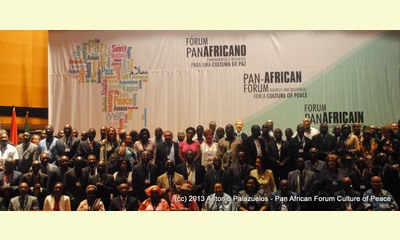|
|
Panafrican Forum of Culture of Peace: A Youth Perspective
an article by Antonio Palazuelos Prieto
"Youth is the best guarantee for a culture of
peace in Africa"
Jointly organized by UNESCO, the African Union and
the Government of Angola, the Pan-African Forum on
Culture of Peace "Fundamentals and resources for a
Culture of Peace" was hosted by the city of Luanda
from 26 to 28 March 2013. This event was held as
part of celebrations marking the fiftieth
anniversary of the Organization of African Union,
whose main event will be on May 25, Africa Day.

photo by the author
click on photo to enlarge
The Forum was accompanied by the launch of the
African Rally for Culture of Peace and Nonviolence,
promoted by the Pan-African institutions and youth
organizations, and will be developed in the coming
months in African countries.
Both initiatives aim to inspire the construction
of a lasting peace in Africa that guarantees
decent living conditions for its inhabitants,
fundamental for sustainable social development.
African cultural diversity, and Pan-Africanism,
especially youth contributing to the Culture of
Peace were raised as a common banner for resolving
conflicts, reducing inequities and injustices, and
promoting social integration and democracy.
African youth were center stage at the event,
which involved nearly a thousand young people in
the launch of the campaign and about a hundred in
the Forum. One of the thematic lines of the Forum
was "Human resources for peace and development:
the challenge of African youth." This included
four workshops whose panelists were mostly young
activists and representatives of youth and pan-
African organizations. These sessions covered the
motivations and principles of youth participation
in construction of democracy, the mass media and
values of African youth, and the contribution of
youth to gender equality and intergenerational
dialogue.
The final report of the Forum had recommendations,
including the action plan for the Culture of Peace
and Non-Violence in Africa. This document
emphasized the importance of the creation of an
African Youth Observatory, as a body serving to
stimulate and promote the development of African
youth, assisting states in promoting public
policies for this sector and contributing to
research on youth issues and the exchange of
experiences and practices for youth among the
African countries.
The Forum symbolically coincided with the
commemoration of the signing of the Peace Accords
in Angola eleven years ago, which ended a bloody
war with more than a million deaths. This
experience strongly affected the Angolan people,
and especially its youth and has made them
advocates of peace in Africa. The country is
committed to the Culture of Peace and Non-
Violence. This may be seen throughout the
territory through intensive awareness campaign for
peace, in which young people are the main
promoters, through its National Youth Council and
youth organizations in the country, important
promoters of the Culture of Peace and its
principles in the society.
(Click here for a Spanish version of this article)
|








|
DISCUSSION
Question(s) related to this article:
How can youth be engaged in democratic transitions?,
* * * * *
Latest reader comment:
The youth in the article Democratic Transitions and the Role of Youth: A Debate are good examples:
Hilton Nyamukapa has recently taken part on a conference on Social Media and Youth Participation located in Amman, Jordan. Fatma Wakil has been actively involved within the Afghan community in the Netherlands as the chairperson of the KEIHAN, Afghan Youth Foundation. Yassine Boussaid is interested in connecting local issues to international organisations and improving the quality of life of the Moroccan and Turkish suburbs of Amsterdam.
Hilton concluded that it is necessary to the positive engagement and subscription of youth to democracy. The youth are often manipulated for a better picture in the media. Hilton cited the memorable injunction of the former President of USA, John F. Kennedy: "Ask not what your country can do for you--ask what you can do for your country." Hilton highlighted the urge to involve youth in the whole democratic process and give them the opportunity to participate in public life.

|
|









